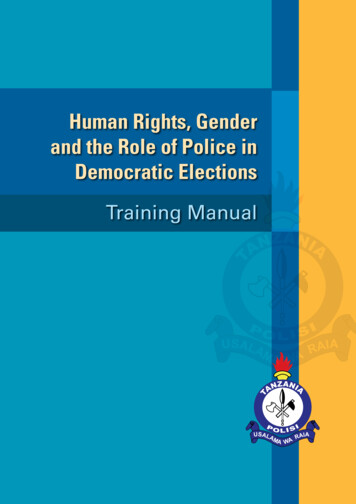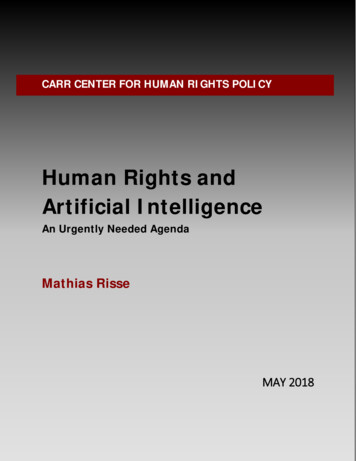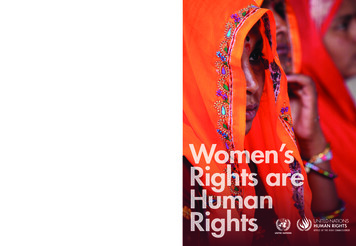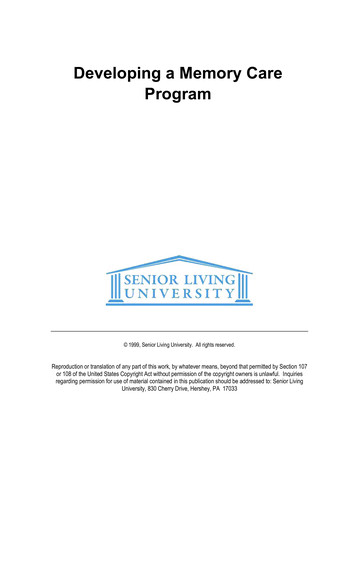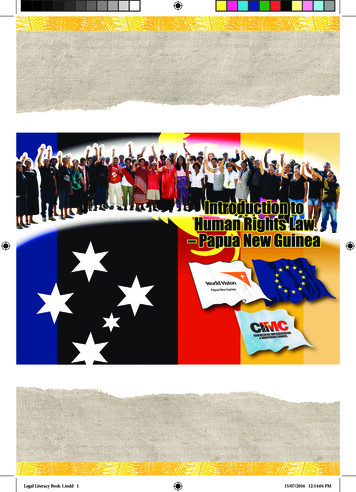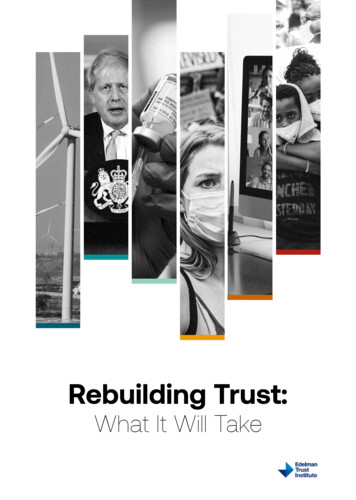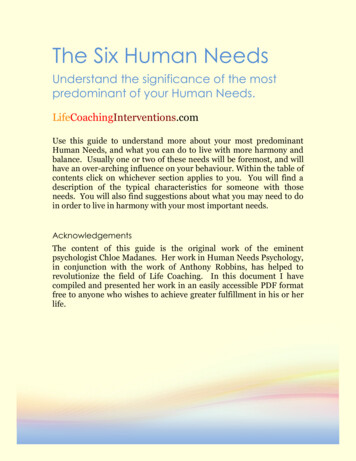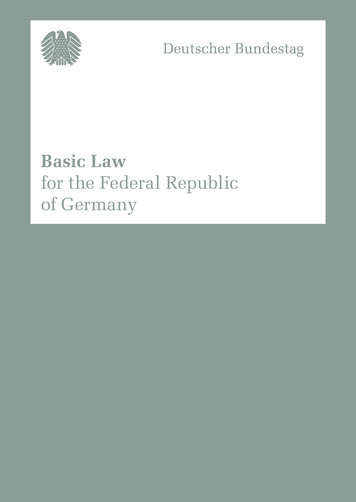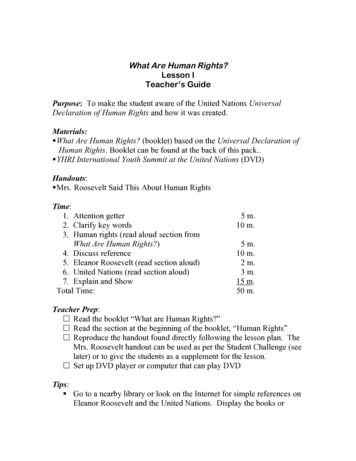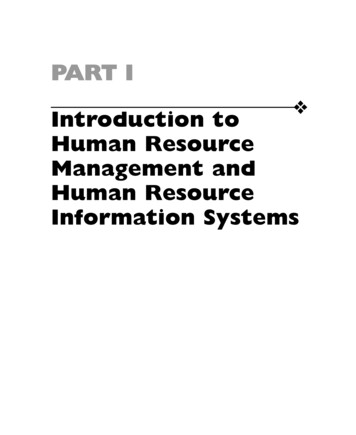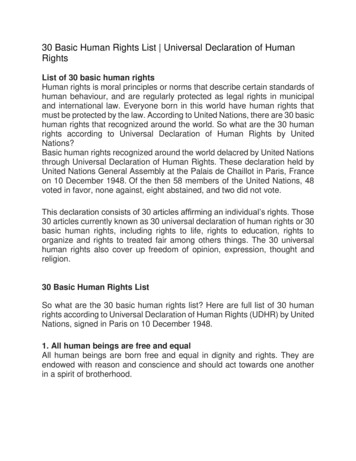
Transcription
30 Basic Human Rights List Universal Declaration of HumanRightsList of 30 basic human rightsHuman rights is moral principles or norms that describe certain standards ofhuman behaviour, and are regularly protected as legal rights in municipaland international law. Everyone born in this world have human rights thatmust be protected by the law. According to United Nations, there are 30 basichuman rights that recognized around the world. So what are the 30 humanrights according to Universal Declaration of Human Rights by UnitedNations?Basic human rights recognized around the world delacred by United Nationsthrough Universal Declaration of Human Rights. These declaration held byUnited Nations General Assembly at the Palais de Chaillot in Paris, Franceon 10 December 1948. Of the then 58 members of the United Nations, 48voted in favor, none against, eight abstained, and two did not vote.This declaration consists of 30 articles affirming an individual’s rights. Those30 articles currently known as 30 universal declaration of human rights or 30basic human rights, including rights to life, rights to education, rights toorganize and rights to treated fair among others things. The 30 universalhuman rights also cover up freedom of opinion, expression, thought andreligion.30 Basic Human Rights ListSo what are the 30 basic human rights list? Here are full list of 30 humanrights according to Universal Declaration of Human Rights (UDHR) by UnitedNations, signed in Paris on 10 December 1948.1. All human beings are free and equalAll human beings are born free and equal in dignity and rights. They areendowed with reason and conscience and should act towards one anotherin a spirit of brotherhood.
2. No discriminationEveryone is entitled to all the rights and freedoms, without distinction of anykind, such as race, colour, sex, language, religion, political or other opinion,national or social origin, property, birth or other status. Furthermore, nodistinction shall be made on the basis of the political, jurisdictional orinternational status of the country or territory to which a person belongs.3. Right to lifeEveryone has the right to life, liberty and security of person.4. No slaveryNo one shall be held in slavery or servitude; slavery and the slave trade shallbe prohibited in all their forms.5. No torture and inhuman treatmentNo one shall be subjected to torture or to cruel, inhuman or degradingtreatment or punishment.6. Same right to use lawEveryone has the right to recognition everywhere as a person before the law.7. Equal before the lawAll are equal before the law and are entitled without any discrimination toequal protection of the law. All are entitled to equal protection against anydiscrimination in violation and against any incitement to such discrimination.8. Right to treated fair by courtEveryone has the right to an effective remedy by the competent nationaltribunals for acts violating the fundamental rights granted him by theconstitution or by law.9. No unfair detainmentNo one shall be subjected to arbitrary arrest, detention or exile.
10. Right to trialEveryone is entitled in full equality to a fair and public hearing by anindependent and impartial tribunal, in the determination of his rights andobligations and of any criminal charge against him.11. Innocent until proved guiltyEveryone charged with a penal offence has the right to be presumedinnocent until proved guilty according to law in a public trial at which he hashad all the guarantees necessary for his defence. No one shall be held guiltyof any penal offence on account of any act or omission which did notconstitute a penal offence, under national or international law, at the timewhen it was committed.12. Right to privacyNo one shall be subjected to arbitrary interference with his privacy, family,home or correspondence, nor to attacks upon his honour and reputation.Everyone has the right to the protection of the law against such interferenceor attacks.13. Freedom to movement and residenceEveryone has the right to freedom of movement and residence within theborders of each state. Everyone has the right to leave any country, includinghis own, and to return to his country.14. Right to asylumEveryone has the right to seek and to enjoy in other countries asylum frompersecution. This right may not be invoked in the case of prosecutionsgenuinely arising from non-political crimes or from acts contrary to thepurposes and principles of the United Nations.15. Right to nationalityEveryone has the right to a nationality. No one shall be arbitrarily deprivedof his nationality nor denied the right to change his nationality
16. Rights to marry and have familyMen and women of full age, without any limitation due to race, nationality orreligion, have the right to marry and to found a family. They are entitled toequal rights as to marriage, during marriage and at its dissolution. Marriageshall be entered into only with the free and full consent of the intendingspouses. The family is the natural and fundamental group unit of society andis entitled to protection by society and the State.17. Right to own thingsEveryone has the right to own property alone as well as in association withothers. No one shall be arbitrarily deprived of his property.18. Freedom of thought and religionEveryone has the right to freedom of thought, conscience and religion; thisright includes freedom to change his religion or belief, and freedom, eitheralone or in community with others and in public or private, to manifest hisreligion or belief in teaching, practice, worship and observance.19. Freedom of opinion and expressionEveryone has the right to freedom of opinion and expression; this rightincludes freedom to hold opinions without interference and to seek, receiveand impart information and ideas through any media and regardless offrontiers.20. Right to assembleEveryone has the right to freedom of peaceful assembly and association. Noone may be compelled to belong to an association.21. Right to democracyEveryone has the right to take part in the government of his country, directlyor through freely chosen representatives. Everyone has the right of equalaccess to public service in his country.
22. Right to social securityEveryone, as a member of society, has the right to social security and isentitled to realization, through national effort and international co-operationand in accordance with the organization and resources of each State, of theeconomic, social and cultural rights indispensable for his dignity and the freedevelopment of his personality.23. Right to workEveryone has the right to work, to free choice of employment, to just andfavourable conditions of work and to protection against unemployment.Everyone, without any discrimination, has the right to equal pay for equalwork. Everyone has the right to form and to join trade unions for theprotection of his interests.24. Right to rest and holidayEveryone has the right to rest and leisure, including reasonable limitation ofworking hours and periodic holidays with pay.25. Right of social serviceEveryone has the right to a standard of living adequate for the health andwell-being of himself and of his family, including food, clothing, housing andmedical care and necessary social services, and the right to security in theevent of unemployment, sickness, disability, widowhood, old age or otherlack of livelihood in circumstances beyond his control. Motherhood andchildhood are entitled to special care and assistance. All children shall enjoythe same social protection.26. Right to educationEveryone has the right to education. Education shall be free, at least in theelementary and fundamental stages. Elementary education shall becompulsory. Technical and professional education shall be made generallyavailable and higher education shall be equally accessible to all on the basisof merit.
27. Right of cultural and artEveryone has the right freely to participate in the cultural life of thecommunity, to enjoy the arts and to share in scientific advancement and itsbenefits. Everyone has the right to the protection of the moral and materialinterests resulting from any scientific, literary or artistic production of whichhe is the author.28. Freedom around the worldEveryone is entitled to a social and international order in which the rights andfreedoms set forth in this Declaration can be fully realized.29. Subject to lawEveryone has duties to the community in which alone the free and fulldevelopment of his personality is possible. In the exercise of his rights andfreedoms, everyone shall be subject only to such limitations as aredetermined by law solely for the purpose of securing due recognition andrespect for the rights and freedoms of others and of meeting the justrequirements of morality, public order and the general welfare in ademocratic society.30. Human rights can’t be taken awayNothing in this Declaration may be interpreted as implying for any State,group or person any right to engage in any activity or to perform any actaimed at the destruction of any of the rights and freedoms set forth herein.So those are all Universal Declaration of Human Rights list by United NationsGeneral Assembly. All universal human rights list above commonly knownas 30 basic human rights that must be respected and protected by the law.
Dec 30, 2018 · international status of the country or territory to which a person belongs. 3. Right to life Everyone has the right to life, liberty and security of person. 4. No slavery No one shall be held in slavery or servitude; slavery and the slave trade shall be prohibite
